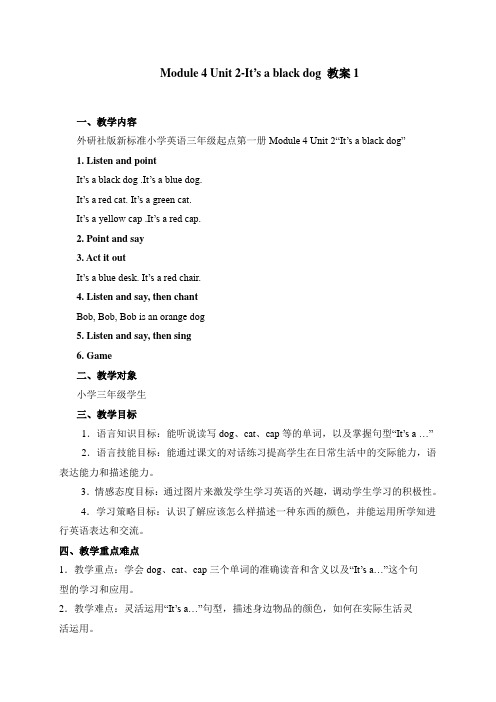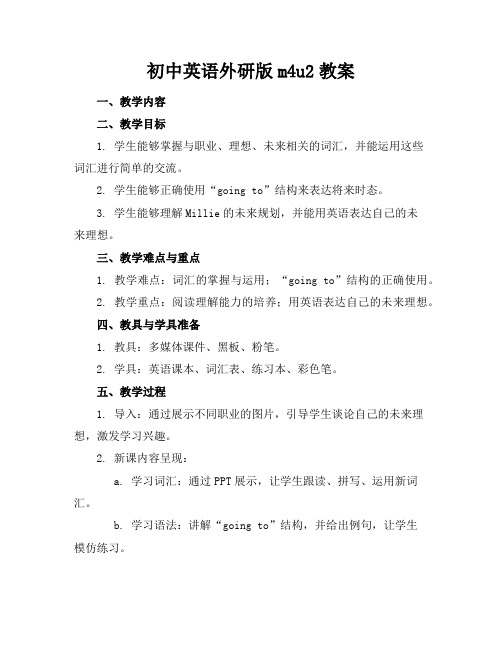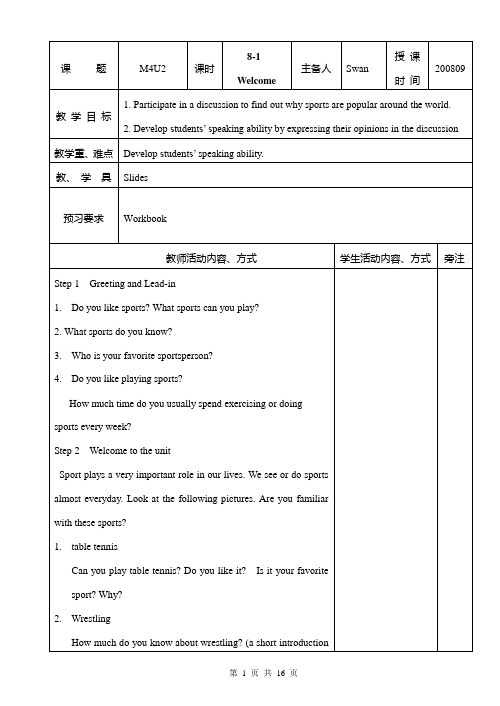M4U2 教案
M4U2教学设计

Module 4 Unit 2 Does Lingling like oranges?教学设计I . Teachi ng Aims1. La nguage kno wledge1.1 全体学生能进一步应用:Do you like...? Y es, I do. No, I don'.1.2部分学生能初步应用:Does he/she like...? Yes, she does. No, he doesn't.1.3 全体学生能理解:meat, rice, noodles, fish, milk, does, orange, apple, banana, pear, doest=does not.2. La nguage Skills2.1 全体学生能听懂:Do you like...? Yes, I do. No, I don t.Does he/she like...? Yes, he/she does. No, he/she doesn't.2.2 全体学生能说:Do you like...? Yes, I do. No, I don t.2.3全体学生能整体感知:rice, no odles.3.Se ntime nt以童话故事《小红帽》为主线,让孩子在兴趣中学,在学中玩。
II . Teachi ng Key Points1.Sentences: Do you like...? Yes, I do. No, I don t.Does he/she like...? Yes, he/she does. No, he/she do t s n2.Words: meat, rice, no odles, fish, milk, does, oran ge, apple, banana,pear, doesn't二does not.in .Teaching Difficult Points本节课首次尝试将童话故事融入英语课堂教学中,对于学生的接受能力及课堂反应都是未知的。
M4U2-It's a black dog 教案1

Module 4 Unit 2-It’s a black dog 教案1一、教学内容外研社版新标准小学英语三年级起点第一册Module 4 Unit 2“It’s a black dog”1. Listen and pointIt’s a black dog .It’s a blue dog.I t’s a red cat. It’s a green cat.It’s a yellow cap .It’s a red cap.2. Point and say3. Act it outIt’s a blue desk. It’s a red chair.4. Listen and say, then chantBob, Bob, Bob is an orange dog5. Listen and say, then sing6. Game二、教学对象小学三年级学生三、教学目标1.语言知识目标:能听说读写dog、cat、cap等的单词,以及掌握句型“It’s a …”2.语言技能目标:能通过课文的对话练习提高学生在日常生活中的交际能力,语表达能力和描述能力。
3.情感态度目标:通过图片来激发学生学习英语的兴趣,调动学生学习的积极性。
4.学习策略目标:认识了解应该怎么样描述一种东西的颜色,并能运用所学知进行英语表达和交流。
四、教学重点难点1.教学重点:学会dog、cat、cap三个单词的准确读音和含义以及“It’s a…”这个句型的学习和应用。
2.教学难点:灵活运用“It’s a…”句型,描述身边物品的颜色,如何在实际生活灵活运用。
五、教学方法游戏教学法直观教学法任务教学法六、板书设计单词:dog 、cat 、cap七、教材分析《It is a black dog.》一课出自《新标准英语》小学三年级起点的Book1,Module4,Unit2。
其主要教学内容是用句型It’s a…来描述有颜色的动物或物品,在Unit1中,学生已经学会了几种颜色的单词。
初中英语外研版m4u2教案

初中英语外研版m4u2教案一、教学内容二、教学目标1. 学生能够掌握与职业、理想、未来相关的词汇,并能运用这些词汇进行简单的交流。
2. 学生能够正确使用“going to”结构来表达将来时态。
3. 学生能够理解Millie的未来规划,并能用英语表达自己的未来理想。
三、教学难点与重点1. 教学难点:词汇的掌握与运用;“going to”结构的正确使用。
2. 教学重点:阅读理解能力的培养;用英语表达自己的未来理想。
四、教具与学具准备1. 教具:多媒体课件、黑板、粉笔。
2. 学具:英语课本、词汇表、练习本、彩色笔。
五、教学过程1. 导入:通过展示不同职业的图片,引导学生谈论自己的未来理想,激发学习兴趣。
2. 新课内容呈现:a. 学习词汇:通过PPT展示,让学生跟读、拼写、运用新词汇。
b. 学习语法:讲解“going to”结构,并给出例句,让学生模仿练习。
c. 阅读理解:让学生阅读Millie's future部分,回答相关问题,提高阅读能力。
3. 例题讲解:针对词汇和语法点,给出典型例题,进行讲解和练习。
4. 随堂练习:让学生根据所学内容,进行词汇填空、句子翻译等练习,巩固知识。
5. 小组活动:分组讨论,让学生用英语分享自己的未来理想,并使用“going to”结构。
六、板书设计1. 词汇:jobs, ambitions, future等。
2. 语法:“going to”结构。
3. 阅读理解:Millie's future。
七、作业设计1. 作业题目:用英语写一篇关于自己未来理想的短文,至少80词。
2. 答案:略。
八、课后反思及拓展延伸1. 课后反思:关注学生在课堂上的参与度,及时调整教学方法和节奏。
2. 拓展延伸:鼓励学生在课后了解更多关于不同职业的信息,为未来的职业规划做好准备。
同时,建议学生观看与未来职业相关的英语视频,提高英语听说能力。
重点和难点解析1. 教学难点与重点的确定。
M4U2教案

M4U2教案书香课堂六年级英语学科教案主备:推进组长:行政组长:副校长:教学内容:M4U2The apples are falling down the stairs一、课型:新授课二、教学目标:1、知识与技能:学习目标语句Who can help me? The apples are falling down the stairs. 能够听懂会说本模块句型,能运用所学语言进行询问及描述。
2、 3、过程与方法:运用英语交流与合作的能力. 情感态度与价值观:激发学生学习英语的兴趣及运用英语交流的热情,使学生在学习中建立自信,提高学生参与语言活动的积极性,并培养学生能积极主动帮助他人的好品质。
三、教学重点:Who can help me? The apples are falling down the stairs并能在实际情景中运用。
四、教学难点:stairs的发音。
五、经典链接:Cannot see the wood for the trees.一叶障目,不见泰山。
六、教学课时:三课时七、教学过程第一课时教学内容:M4U2The apples are falling down the stairs的 Activity1- 3 教学重难点:Who can help me? The apples are falling down the stairs. Step 1 warming upsing a songThe oranges are falling, who can help me. The oranges are falling, who can help me. Sorry, I can’t help you, my dear friends.书香自主合作探究效率书香课堂六年级英语学科教案 I can help you, my dear friends. Step 2 lead in 1、Read the passage by themselves. And find out the words you don’t know on the blackboard.(教师并讲授学生不会的单词-stair,mess) 2、listen to the tape andunderline “falling”. 3、ask them who can help the girl. And how to help.Step3 listen to the tape and do the activity 2.(match the people with thepictures.) Check the answer and ask them. T: can the man/woman/boy/girl help?What will they do? Step4 do activity 3 Step 5 talk about “will”. 用法:Will =be going to do Step 6 homework 完成《同步指导》八、板书设计:M4U2Theapples are falling down the stairs Who can help ・・・? Will =be going to do九、教学后记:书香自主合作探究效率书香课堂六年级英语学科教案第二课时一、教学内容:M4U2The apples are fallingdown the stairs的 Activity4- 5 二、教学重点:正在进行时三、教学过程: Step 1 warming up 请同学背课文 Step 2 listen and say, then say the poem Game:小小翻译家,通过翻译看学生是否理解诗歌意思 Step 3play a game Do activity 5 : what ishe doing? 组员轮流上台表演动作,其他组员说句子:Here comes ?. He/she is ? 小组展示任务分工、合作教师点拨、总结组员轮流上台表演动作,其他组员说句子:Herecomes ?. He/she is ? Step 4 讲评《同步指导》 Step 5 homework 四、板书设计:M4U2The apples are falling down the stairs Here comes=?is coming Be+V.+ing 五、教学后记:G1-9 Here comes=?is coming. 书香自主合作探究效率书香课堂六年级英语学科教案第三课时一、阅读理解训练 The students were havingtheir chemistry class. Miss Li was telling the children what water was like.After that, she asked her students, “What’s water?” No one.Miss Li askedagain,“Why don’t you answer my question?Didn’t I tell you what water islike?” Just then a boy put up his hand and said,“Miss Li,you toldus that water has no color and no smell.But where to find such kind of water?The water in the river behind my house is always black and it has a badsmell.”Most of the children agreed With him.“I’m sorry,children.”said the teacher,“Our water is getting dirtier anddirtier.That’s a problem.” 1.The students were having their _______class. A.English B.Chinese C.chemistry D.math 2.Miss Liwas telling the children what ______ was like. A.water B.air C.earth D.weather 3.A boy said,“The water in the river behind my house is always___.” A.white B.black C.clean D.clear 4.Most of thechildren _______ the boy. A.agreed with B.wrote to C.heardfrom D.sent for 5.The water in the river has color and smellbecause it is getting ____. A.more and more B.less and lessC.cleaner and cleaner D.dirtier and dirtier key C A B A D Jim isan English boy. He comes to China with his father and mother. 书香自主合作探究效率书香课堂六年级英语学科教案 They come here to work. Jim comes here to study.He is in No.5 Middle School. He gets up early every day. He isn’t late forschool. He studies hard. He can read English well. He often helps us with ourEnglish, and we often help him with his Chinese. After class he likes playingfootball, swimming, running, jumping and riding. He makes many friends here.We are glad to stay with him. On Sunday he often helps his mother clean thehouse, mend something or do the shopping. He likes Chinese food very much.。
M4U2教案

M4 Unit 2 Reading The Olympic Games制卷; 张柳审核:顾婷编号:18 Teaching aims1.To help students to get a general idea about the text.2.To make students familiar with detailed information about the text.3.To get the students know the spirits of the Olympic Games.Teaching difficulties1.How to help the students understand the passage better and finish all the exercises.2.How to help the students develop their creative and comprehensive abilitiesTeaching Procedures:Step I: Lead-inAsk students some questions to excite their interest in the Olympic Games.1.Where did the ancient Olympics begin?A. RomeB. IndiaC. GreeceD. the U.S.A2. When and where did the modern Olympics begin?A. 1896 OlympiaB. 1896 AthensC. 1900 OlympiaD. 1900 Athens3.What do the five rings on the Olympic flag stand for?A. five continentsB. five oceansC. five races4.What is the mascot(吉祥物) of Beijing Olympics?5. When and where will be the next Olympic Games held?Step II: PresentationAsk students to get the main idea of each paragraph to better their understanding Part 1: (Para.1) the topic of the speechPart 2: (Para. 2-4) the history & significance of the Olympic Games Part 3: (Para. 5-8) some famous athletes and their great contributions Part 4 (Para. 9-10) the closure of the speechAsk students to listen to the first 4 paragraphs to get a knowledge of the differences and similarities of the ancient and contemporary Olympic Games.❖When did the ancient Olympic Games begin?❖Where were they held and how often?❖what ancient sports can still be seen today?❖Who could compete at the ancient Olympic Games?How about the contemporary Olympic Games today?Ask students to fill in the blanks according to the text so that they can learn some spirits from those athletesStep III Task-based reading。
M4U2 教案设计

通过学生实际动作的演示来让学生在真实的情景中实际感知现在进行时态的使用,学生既容易掌握,也易于激发学生学习英语的乐趣。
Step4:Game
趣味组合
教师让学生分为3组,第一组的学生写出一个句子的主语和相应的be动词(am/is/are),第二组的学生每人写一个正在进行中的行为(动词或动词短语的ing形式),第三组的学生每人写出一个包括介词的地点或场所。每组轮流派一名学生朗读所写内容,组成一个有趣的句子。如:The elephants are playing computer games in the lake. 然后三人一组开展活动,比一比哪三个同学的句子最有趣,教师评出“最佳组合奖”。
3.养成积极热情,乐于助人的好习惯。
教学重点与难点
现在进行时态的运用、求助及帮助别人的简单表达
教学辅助
PPT、单词卡片、奖章
教学方法
情境教学法、新五步教学法
教学内容
教学活动
设计意图
教师活动
学生活动
Sபைடு நூலகம்ep 1:Warming-up
1.Greeting
2.Say the poem together
课前师生用英语互相问候,一起吟唱上节课所学诗歌,既复习了现在进行时态,又把学生带入快乐的英语学习氛围,激发学生学习英语的兴趣。
家庭作业:
1.听录音,模仿朗读课文。
2.背诵本模块的诗歌。
3.想一个有趣的,自己不能单独完成的动作,下节课上课展示,并寻求帮助。
板书设计:M4U2 The apples are falling down the stairs
12 3 4 What are they doing? pick up
牛津英语M4U2教案

3.Get Ss to scan the article again and do C2.
4.Help Ss to get the idea of the reading strategies.
Help them learn some language items.
教学重、难点
How to read a speech
How to grasp the new words.
教、学具
Teaching methods|
Improve the students’ reading comprehension.
2.basketball and football, which do you prefer?
3.No matter what kind of sport you take part in ,what are the basic qualities you need to possess in order to be successful in that sport?)(video ofJordan)
To help the students master the use of some important language points.
The usage of some words, phrases and sentence patterns.
教、学具
Slides
预习要求
教师活动内容、方式
学生活动内容、方式
1.table tennis
Can you play table tennis? Do you like it?Is it your favorite sport? Why?
Module 4 Unit 2 I’m going to be eleven.(教案)-2021-2

3.Learn to say the months.
五、Task completion(当堂检测)
※LUCY要开一个生日party,你能根据短文为LUCY写一封请柬吗?
Lucy:HiJane,I’m going to have a party.
Jane:What’s it for?
How old are you going to be?
I am going to be…….
反思
2、Homework
通过启发与合作的学习方式,学习邀请卡的内容,中国写地址是从大到小,外国写地址是从小到大,这是中西方文化的差异。
把以前学过的6个月份加到里面,一起训练
巩固课文,完成并检查学生对课文的掌握情况
作业
设计
仿照本课给自己的朋友写一张节日party的邀请卡片
板书
设计
M4U2 Amy is going to be 11
知道英文地址和中文地址写法的区别,了解中西方文化的差异,在学习中增进友谊
教学
重点
认真学习课文,积极实践
难点关键repl源自, play发音区别学情分析
五年级学生还存在着学习方法和学习策略经验不足等问题,但他们却有着极强的求知欲强和表现欲。根据学生的心理特点我课上多以表扬为主,注重对学生英语学习兴趣的培养,鼓励他们大胆说、积极做、认真想!让学生们在玩玩、做做、说说中学习英语。
教案
NO:
课 题
M4U2 I’m going to be eleven.
授课时间
主备教师
课型
巩固
课时
1
授课人
教学
目标
知识技能
继续学习be going to句型,学习如何给别人写一封邀请函,掌握月份单词(7—12月份),灵活运用所学的句型
- 1、下载文档前请自行甄别文档内容的完整性,平台不提供额外的编辑、内容补充、找答案等附加服务。
- 2、"仅部分预览"的文档,不可在线预览部分如存在完整性等问题,可反馈申请退款(可完整预览的文档不适用该条件!)。
- 3、如文档侵犯您的权益,请联系客服反馈,我们会尽快为您处理(人工客服工作时间:9:00-18:30)。
教案个数:执行日期:Unit 2 Sporting events Welcome to the unitTeaching Aims:1. Arrange a discussion for Ss to find out why sports are popular around the world.2. Encourage Ss to express their own opinions in the discussion.Teaching Important Point:Develop students‟ speaking ability.Teaching Methods:Discussion and free talk to involve each student in class activities.Teaching Aids:1. The multimedia2. The blackboardTeaching Procedures;Step 1 Lead-in by asking the following questions:1. Do you like sports? Why?2. What are your favorite sports?3.What sports do you know? (Show pictures to motivate the students)Step 2 PresentationSport plays a very important role in our lives. We see or do sports almost everyday. Summarize familiar games and understand unfamiliar ones.Ball games:V olleyball, basketball, football, baseball, badminton, table tennis, golf, rugby, ice hockey, etc.Track and field:long jump, high jump, pole jump, discus, shot-put, race, relay race, etc.Water games:swimming, diving and water poloGymnastics:Men’s events---rings, horizontal bar, double bars, parallel bars, vaulting horse, pummeled horse,floor exercise, etc.Women’s events---balance beam, high and low bar, uneven bars, vaulting horse, floor exercise, etc.It is said that gymnastics and diving are two of the most beautiful sports in the world, because they both display elements of strength and beauty.Wrestling is an ancient sport often appeared as the main event in the earliest Olympic Games. Wrestling exists in many different styles but only two styles feature in the Olympics, namely freestyle and Greco-Roman. Greco-Roman wrestling allows the use of only the participants‟upper bodies; however, freestyle allows the use of legs.Boxing became an Olympic sport in 688BC and is still popular today. The boxer uses his or her fists to punch The opponent‟s head and body with the aim to knock the opponent out.Kung fu is a traditional sport in China.Are you interested in this sport?Do you enjoy watching kung fu films?Step 3 Practice : Ask Ss to discuss the following questions .What sports do you usually play? How much time do you usually spend doing sports every week?No pains, no gains. No matter what kind of sports you take part in, what do you have to sacrifice (牺牲) in order to be successful in that sport?Step 4 Discussion1. It is well known that China has been making much progress in many sports events. Do you know what they are?2. What can we do for 2008 Beijing Olympics?Step 5 Homework1. Surf the Internet to find more information about sports.2. Write a composition about why people all over the world are crazy about sports.教案个数:执行日期:Unit 2 ReadingTeaching Aims:1.Enhance students‟ reading abilities.2.Enable Ss to adopt the strategy reading a speech and catch the main idea of the text. Teaching important points:1.Help Ss know some background knowledge about the history and the development of theOlympic Games.2.Help them learn some language points.Teaching methods:1. Imp rove the students‟ reading comprehension.2. Discussion to make every student work in class.Teaching aids:1.the multi-media2.the blackboard.Teaching procedures:Step 1. Lead- in1. Show pictures about Olympic Games to motivate the Ss‟ enthusiasm.2.Talk about the Olympics and encourage the students to share their information and expresstheir opinions.As we all know, the Olympic Games are held every four years and it is a great honor for a country to host the Games.How much do you know about the Olympics, for example, its history, ceremonies and sporting events?1. How many Olympic games did you see? Where were they held?2. Do you think they are exciting?3. Who is your favorite athlete and who do you think is the greatest Olympian? Why?Step 2. Fast readingAsk Ss to scan the article and answer the three questions in Part A.1. What is the speech about?The history and significance of the Olympic Games.2. Where were the ancient Olympic Games held?At Olympia in Greece.3. Who restarted the modern Olympic Games? Pierre de CoubertinStep 3 Careful reading1.Read the passage again and check the errors in each sentence.1)According to the speech, the speaker is an athlete. an LOC member2). The first ancient Olympic Games were held in AD776. 776BC3). In the past, only athletes that spoke Italian were allowed to compete.Greek4). The aim of the modern Olympic Games is to make countries and people compete side byside. live peacefully5). The first modern Olympic Games were held in Rome in 1896. Athens6). Deng Yaping won four Olympic gold medals for tennis. table tennis2. Try to fill in the form according to the passage. .3. Finish exercise D and E.Step 4. Discussion1. Do you think Chinese athletes such as DengYaping and LiuXiang are as great as Muhammad Ali or Michael Jordan? Why?2. In our life, we often hear Sports Spirit. What kind of Sports Spirit can you learn from them? And how can you use the sports spirit in your studies?Step 5 Language points1. (L1) delighted adj. 高兴的; 欣喜的1) He was delighted to be invited to the wedding.2) I am delighted at your progress made in studies.2.(L2) significance n.意义; 意味; 重要性1) It‟s good that he has realized the significance of studying English.2) You should pay more attention to the significance of the speech delivered by our headmaster.significant adj.有意义的;重要的3.(L10) compete vi.竞争,对抗Compete with/against sb for sth1) Several dogs are competing with/against each other for a bone.2) Companies are competing against each other for the contract.competition n.竞争;比赛competitor n. 竞争者;选手4.(L11) in honor of sb 为了纪念;向…表示敬意The ceremony was held in honor ofthose killed in the battlehonor sb with sth 给某人以荣耀1) Will you honor me with a visit?2) It‟s an h onor to be invited to the party.5. (L15) ,no matter what language they speak.The phase no matter what means “whatever the situation is, something is always true” and used to introduce an adverbial clause. Similar phrases such as no matter how, no matter whether and no matter when can be used in the same way.e.g. No matter what difficulty she meets with, she will never give up.No matter how I tried to persuade him, he just didn‟t take my words seriously.No matter whether it is rainy or sunny, the football match will be played as planned.Step 6 Have a try:1. He tried his best to solve the problem,_____ difficult it was.A.howeverB. no matterC. whateverD. although2. Everyone gave five pence as a contribution _____ the Famine Relief Fund.A. atB. onC. toD. over3. The president honored us _______ a personal visit.A.t0B. withC. forD. of4. We are in ________ with four other companies for the contract.petingB. competitorC. competitionD. companion5._______ were the manager and his wife, as well as their son.A.PresentedB. To presentC. PresentD. Presence6. The laboratory was named after the science _______ him.A. in spite ofB. in case ofC. in terms ofD. in honor ofStep 7 Homework1. Try to remember the useful words, phrases and sentence patterns and know how to use them freely.2. Finish exercises in Workbook.教案个数:执行日期:Unit 2 Word powerTeaching Objectives:1. To enlarge students‟ vocabulary by applying the rules of making compound words.2. To get students to learn some words and expressions related to Olympic sports.3. To improve students‟ speaki ng ability.Teaching Important and Difficult Point:To master the formation rules of compound words.Teaching Approaches:Task-based approachesForm of Activities:Individual, pair or group work ..Teaching Aids:The multimedia and the blackboardTeaching Procedures:Step 1. Lead-inAsk the students to read the following dialogue:A: Did you know that Liu Xiang was the first Asian to win a gold medal for the men‟s 110-metre hurdles in the Olympic Games?B. Yes! Everyone knows that he is a very hard-working sportsperson. He is a well-trained winner.Let the students study the italicized words and ask them two questions:Do you know the meanings of the words?Do you know how the words are made?Give them a few minutes to think. They may discuss with their partners if necessary.110-metre(n.)--- 110 (num.), meter (n.)hard-working (adj.)--- hard (adv.), working(v-ing)sportsperson (n.)--- sports(n.), person(n.)well-trained (adj.)--- well(adv.), trained (v-ed)Step 2. Compound wordsHave students study the words that they have listed and then read the words on page26 to understand the formation rules of compound adjectives and compound nouns.To form compound adjectives:To form compound nouns:Ask the students to put the following into English:1.项链necklace2.雨衣raincoat 3 .男教师man teacher4.聚会get-together5.书店bookstore6.地震earthquake7.消防队员firefighter 8.气象员weatherman9.金鱼goldfish 10.说英语的English-speaking8. Ask the students:Can you recognize the formation of the following compound words? What parts of speech are they and what do they mean? Take a guess and then check in the dictionary. Try to use them in the letter below. ( page26, SB)Step 3. Olympic sports and events.Answers:Part A: a (3) b (2) c (1) d (4)Part B:Step 4. Homework1. Finish the workbook.2. Pre-view grammar and usage.教案个数:执行日期:Unit 2 Grammar and usageTeaching Aims:1、Show Ss that modal verbs can be used to talk about ability, obligation, certainty orpermission, to make requests, suggestions, offers and to give advice.2、Enable students to understand that some modal verbs can be used with the continuousform and the perfect form to talk about current affairs or past actions.Teaching Important Points:1、Develop the students‟ ability of using modal verbs.2、How to make students master the usage of modal verbs.Teaching Difficult Points:Develop the students‟ ability of using modal verbs and how to make students master the usage of modal verbs.Teaching Methods:Explanation and exerciseTeaching Procedures:Step1 Warming upSay some sentences to warm up students:Now, many of us can speak English quite well, but a few years ago, we could n‟t. Yes or no?If we talk about the ability someone has, we use the modal verb …can‟.If we want to express that it is necessary for us to do something, what modal verb do we use? must What other modal verbs can you think of?Step3 presentationShow the usage of the modal verbs on the screen.Modal verbscan/could表能力(1) I don‟t think he can solve the problem without any help.(2) Can you help me to work out this maths problem?ought to/should1.表示义务,“应该”,用于各种人称You should respect your parents.You shouldn‟t spend much time surfing the Internet.2.表示推测,“想必,估计”的意思。
